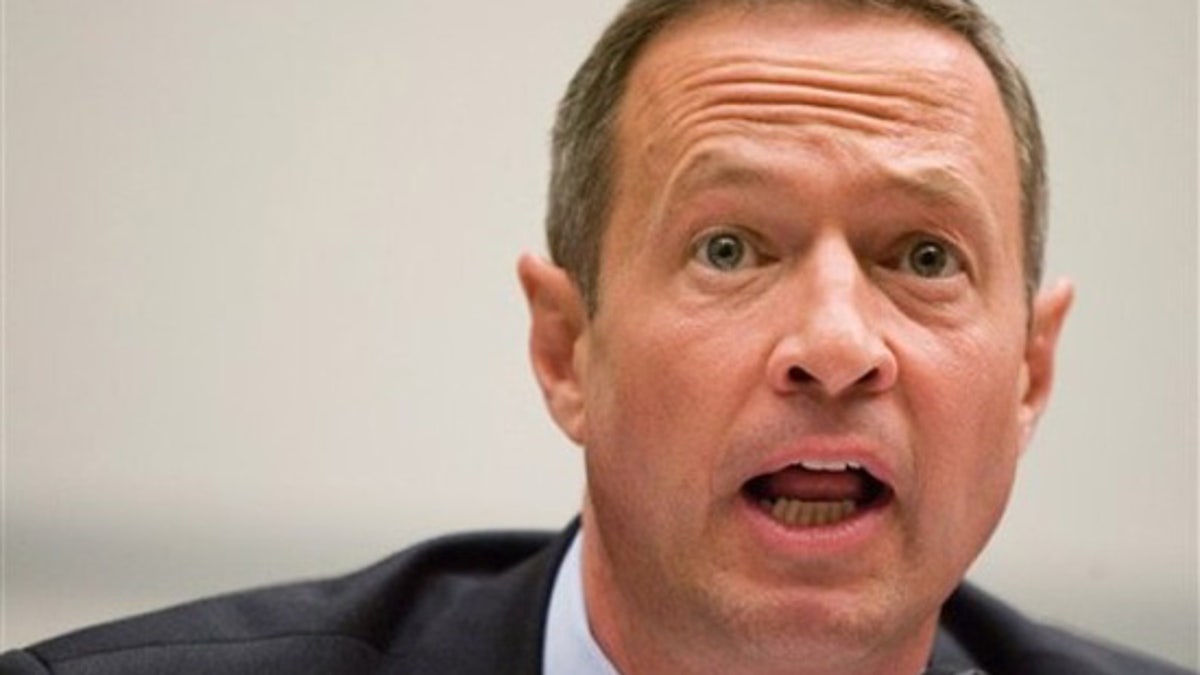
Maryland Governor Martin O'Malley testifies before the Committee on Oversight and Government Reform hearing on "Tracking the Money: Preventing Waste, Fraud and Abuse of Recovery Act Funding" on Capitol Hill, Wednesday, July 8, 2009, in Washington. (AP)
As 13 state attorneys general, most of them Republicans, await the next step in their lawsuit challenging the constitutionality of forcing Americans to obtain health insurance, other states led by Democrats are already moving at full throttle to implement the new health care law.
In Maryland, Gov. Martin O'Malley signed an executive order on Wednesday that creates a health care reform council to examine how the $938 billion, 2,400-page law will affect families in the state. And in other states, like Oregon, the effort to revamp the health care system has been long under way.
"Over the last three years, we've acted ... to expand access to quality, affordable health care to more than 160,000 Marylanders, 78,500 of which are children," O'Malley, a Democrat, said in a written statement. "These federal reforms will build on our progress. Thanks to our Congressional delegation and President Obama's leadership, we will help even more families."
But Maryland Republican Party Chairman Audrey Scott quickly denounced O'Malley for supporting the "mother of all unfunded mandates."
"O'Malley has already presided over the largest job losses, budget deficit and tax hikes in Maryland history. Now he's enthusiastically supporting the mother of all unfunded mandates," Scott said Thursday. "This massive expansion of Medicaid will cost the state's taxpayers billions by adding hundreds of thousands of new Marylanders to the Medicaid rolls. It's simply unaffordable."
Meanwhile, health officials in Oregon are touting the work they've been doing since July, when the state legislature created the Oregon Health Authority to implement forthcoming federal reforms as quickly as possible. Efforts to overhaul health care in the state actually began in 2007 with the establishment of the Oregon Health Fund Board, a nine-member citizen entity that serves as the policy-making body for the health authority.
"While the eyes of the nation are focusing on the health care debate in Congress, Oregon will continue to lead with changes on a state level," Democratic Gov. Ted Kulongoski said in November. "Ultimately creating policies and programs that improve the health of Oregonians is going to come down to state innovation, and this board and agency will be leading the way."
But Republican officials in Oregon say Kulongoski has made a "partisan decision" to move forward on reforming health care.
"It's bad policy and it's definitely something we oppose," said Greg Leo, spokesman for the Oregon Republican Party. "It ought to be repealed and it ought to be repealed now. To implement a bill that does not appear to be sustainable -- politically, fiscally or constitutionally -- is a really bad idea."
Minutes after Obama signed the health care legislation on Tuesday, Florida Attorney General Bill McCollum, a Republican, filed a lawsuit in federal court, claiming that Congress doesn't have the constitutional right to require citizens to buy health coverage. Attorneys general in South Carolina, Nebraska, Texas, Michigan, Utah, Pennsylvania, Alabama, South Dakota, Idaho, Washington, Colorado and Louisiana have agreed to join the lawsuit, which White House officials say will fail. A 14th state, Virginia, filed a separate suit. Other states, like Ohio, are being urged to join the effort. (All the attorneys general are Republican except Louisiana's James Caldwell.)
Eight congressmen in Ohio, including House Minority Leader John Boehner, have called on the state's attorney general to consider joining McCollum's lawsuit, citing an "unconstitutional and unprecedented" federal mandate.
But the Oregon Health Authority notes that in its case, the new federal law will support the local efforts already in motion.
"The federal legislation helps us fulfill the promise of the Oregon Health Plan to expand coverage to low-income working families and make it more feasible to achieve our goal of affordable health care for all by 2015," the authority says on its Web site. "The legislation will bring $5 billion in new Medicaid funds to Oregon over the next 10 years."
And like the Oregon law, the new federal law calls for the creation of health insurance exchanges by 2014. Oregon has been developing a business plan to create that marketplace for months. Similar versions of those exchanges have existed since 2007 in Massachusetts, where it's called the Commonwealth Connector, and since last August in Utah.
Elsewhere, Wisconsin launched a health care reform effort in February 2008 aimed at providing universal coverage for children, simplifying existing programs and removing barriers to continual coverage for families.
Back in Maryland, O'Malley has touted the state as a national model for controlling health care costs under the state's "all-payer" hospital rate setting system that requires hospitals in the state to charge the same rate for insured and uninsured patients.
But with the state's budget deficit at $2.5 billion, Scott said, O'Malley should not champion a "tax and spend" agenda.
"We couldn't afford this bill to begin with, but after four years of O'Malley's budget gimmicks and out of control spending, Marylanders have to be wondering what the governor is thinking," Scott, the state GOP leader, said.




